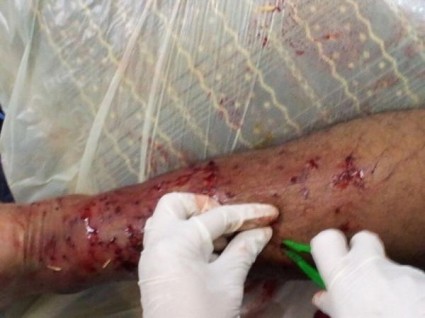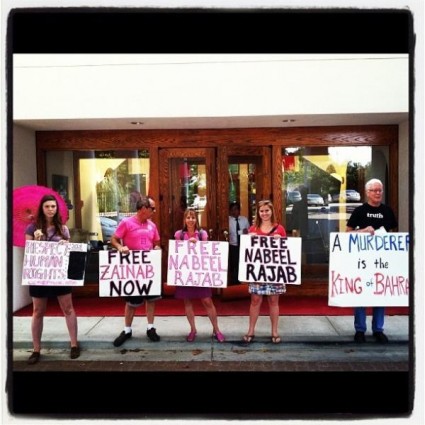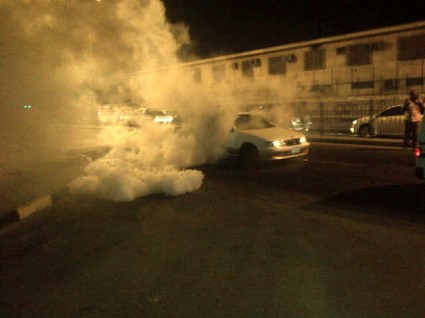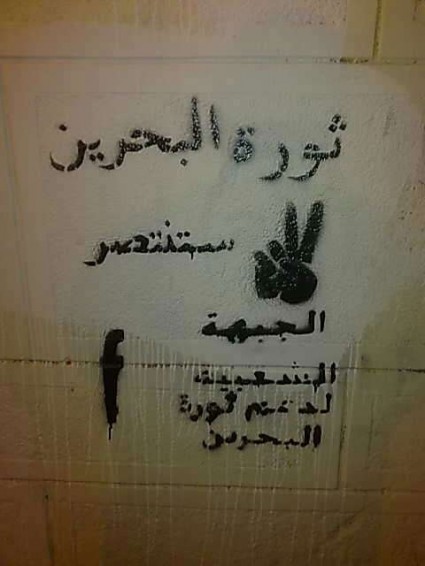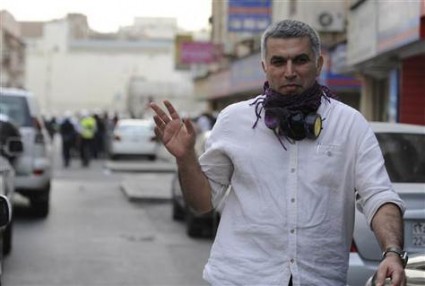All The ‘Right-wing Moves’ – Obama works to make Protest illegal in US – lessons from his ‘friends’ in Bahrain
The government says the anti-protest bill was just a small tweak of the existing law. Don’t believe it.
You Can’t Occupy This
By Dahlia Lithwick and Raymond Vasvari – 19 March, 2012
In post-Occupy America, it’s often hard to know whether new citizen protest laws signal the end of free speech or a mere tweak of the machine. That looks to be the case with the new anti-protest bill that passed the House of Representatives overwhelmingly two weeks ago and was signed into law by the president soon thereafter. On its face, the new legislation doesn’t change a whole lot. Yet the Occupy protesters are in an uproar that the bill both targets them and also signals a radical shift in free speech law. Almost nobody else seems to have noticed it at all. Who’s right?
That all depends on what you want to protest and where.
H.R. 347, benignly titled the Federal Restricted Buildings and Grounds Improvement Act, passed the House 399-3. Such a lopsided vote suggests that nobody in Congress is bothered by this, on either side of the aisle. When President Obama signed it on March 8, almost nobody seems to have cared.
Simply put, the way the bill will “improve” public grounds is by moving all those unsightly protesters elsewhere. The law purports to update an old law, Section 1752 of Title 18 of the United States Code, that restricted areas around the president, vice president, or any others under the protection of the Secret Service. The original law was enacted in 1971 and amended in 2006. At first blush, the big change here is that while the old law made it a federal offense to “willfully and knowingly” enter a restricted space, now prosecutors need only show that you did it “knowingly”—that you knew the area was restricted, even if you didn’t know it was illegal to enter the space. This has been characterized in some quarters as a small technical change that hardly warrants an arched eyebrow, much less a protest.
But it’s important to understand what has changed since the original law was enacted in 1971, because it shows how much a tiny tweak to the intent requirement in a statute can impact the free speech of everyone.
For one thing, the law makes it easier for the government to criminalize protest. Period. It is a federal offense, punishable by up to 10 years in prison to protest anywhere the Secret Service might be guarding someone. For another, it’s almost impossible to predict what constitutes “disorderly or disruptive conduct” or what sorts of conduct authorities deem to “impede or disrupt the orderly conduct of Government business or official functions.”
The types of events and individuals warranting Secret Service protection have grown exponentially since the law was enacted in 1971. Today, any occasion that is officially defined as a National Special Security Event calls for Secret Service protection. NSSE’s can include basketball championships, concerts, and the Winter Olympics, which have nothing whatsoever to do with government business, official functions, or improving public grounds. Every Super Bowl since 9/11 has been declared an NSSE.
And that brings us to the real problem with the change to the old protest law. Instead of turning on a designated place, the protest ban turns on what persons and spaces are deemed to warrant Secret Service protection. It’s a perfect circle: The people who believe they are important enough to warrant protest can now shield themselves from protestors. No wonder the Occupy supporters are worried. In the spirit of “free speech zones,” this law creates another space in which protesters are free to be nowhere near the people they are protesting.
Consider that more than 6,700 people have been arrested at Occupy events since last September. Thus, while these changes to the law are not the death of free speech, they aren’t as trivial as the administration would have you believe. Rather, they are part of an incremental and persistent effort by the government to keep demonstrators away from events involving those at the top of the political food chain.
Let’s start by recalling that political speech—of the sort you might direct toward Newt Gingrich or Queen Beatrix of the Netherlands, both of whom merit Secret Service protection—is what the First Amendment most jealously protects. Demonstrators can almost never be muzzled based on what it is they want to say. The First Amendment also has a special solicitude for speech in what are called traditional public fora. There is a presumed right of access to streets, sidewalks, and public parks for the purpose of engaging in political discussion and protest. And while the government can always impose reasonable limits on demonstrations to ensure public order, that power comes with a caveat: It must never be used to throttle unpopular opinion or to discriminate against disfavored speakers. That is a powerful caveat: The degree of slack a court will cut any given restriction on public protest will rest on whether the government appears to be acting even handedly.
Restrictions that apply equally to all subjects and all points of view will usually be approved by the courts if they are narrowly designed to advance a significant governmental interest, such as public safety. But protest restrictions that discriminate based on subject or viewpoint must be absolutely necessary to serve a compelling state interest. Courts rarely permit them. …more
August 16, 2012 No Comments
The Beat Goes On – US Culture and Witness its Conflict
Beat Goes On Lyrics
by Sonny & Cher
The beat goes on, the beat goes on
Drums keep pounding a rhythm to the brain
La de da de de, la de da de da
Charleston was once the rage, uh huh
History has turned the page, uh huh
The mini skirts the current thing, uh huh
Teenybopper is our newborn king, uh huh
The grocery store’s the super mart, uh huh
Little girls still break their hearts, uh huh
And men still keep on marching off to war
Electrically they keep a baseball score
Grandmas sit in chairs and reminisce
Boys keep chasing girls to get a kiss
The cars keep going faster all the time
Bums still cry “hey buddy, have you got a dime”
August 16, 2012 No Comments
Nabeel Rajab – “Jail me three years or 30 – I will never give up.” “I will continue all my life struggling for democracy and human rights.”
Bahraini court sentences human rights activist Nabeel Rajab to three years in prison for illegal protesting
By Gianluca Mezzofiore – 16 August, 2012 – IBTIMES
A Bahraini court has sentenced prominent human rights activist Nabeel Rajab to three years in prison, for three separate cases of inciting and participating in protests against the Sunni Al-Khalifa monarchy.
Rajab’s attorney, Mohammed al-Jishi, told reporters that each of the three cases carried a one-year jail term. Al-Jishi added that his client, currently head of the Bahrain Centre for Human Rights, plans to contest the sentence.
Following the trial, Rajab’s son, Adam Nabeel Rajab, used Twitter to convey a message from his father.
The message read: “Jail me three years or 30 – I will never give up.”
Series of punishments
The three-year sentence is the latest in a series of punishments for Rajab, who heads up Bahrain’s Centre for Human Rights and has been at the forefront of pro-democracy protests during 16 months of unrest in the Gulf Arab state.
The 48-year-old is already in prison, having received a three-month sentence in June for insulting the Sunni elite on Twitter. Rajab used the microblogging site to claim that residents of the Sunni Muharraq district of Bahrain were supporting prime minister Sheikh Khalifa bin Salman only for financial gain.
Just days before the twitter trial began, Rajab emerged from a one-month prison sentence imposed in early May, when he returned from a protest meeting in Beirut, Lebanon.
He was arrested at Bahrain’s Manama airport on 5 May, after returning from a conference in Beirut, Lebanon.
During the Twitter trial, the activist described his case as “political” and “vindictive”.
In a separate interview, conducted with the international observatory Witness Bahrain, Rajab said: “I believe strongly in peaceful means of struggle. It could take longer time, but has better results.
“I will continue all my life struggling for democracy and human rights.”
August 16, 2012 No Comments
Qatif wounded protesters in urgent need for treatment – Sheikh Tawfiq al-Amer indicted
Saudi Arabia: Qatif wounded protesters in urgent need for treatment & cleric Amer indicted
15 August, 2012 – Silver Lining
Qatif Wounded Protesters In Urgent Need for Treatment
Al Manar – The A-Sharq [East] Center for Human Rights in Saudi Arabia that warned “the wounded peaceful protests in Qatif Eastern province and those who did not review medical centers for fear of their arrest are in real need for urgent medical care.”
In a letter to Doctors Without Borders, the center urged organizations to provide assistance to the wounded protests in Qatif.
They further stressed that ” 20 wounded protests who were shot dead by Saudi security forces fall under the rubric of “disabled” because of the sensitivity and the severity of their injury.”
“As some of the wounded have went to hospitals, others refused to go to hospitals fearing of the arrest in the event they review medical and treatment centers,” the human rights center said.
It further cautioned that “some people still carry bullets in their bodies fired by government forces, and they refuse to risk their lives by either visiting hospitals so that they would be arrested and subjected to torture.”
“On the day of the arrest of Sheikh Nimr Baqir Nimr, about ten thousand demonstrators flooded from the town of al-Awamiya towards the city of Qatif,” the center highlighted and noted that “the police shots led to two martyrs Mohamed al-Fel and Akbar al-Shakhuri.”
” 27 people were injured, including one child, and most of them were treated in home clinics while others were arrested after their visit to the medical centers. “
Saudi officials indict – cleric after year in jail
Saudi Arabian officials have issued an indictment against prominent – cleric Sheikh Tawfiq al-Amer, who has been held in jail for one year without trial.
On Sunday, the authorities issued a list of charges against Sheihk Amer, accusing him of making false statements against the Saudi king, calling for political reform and encouraging people to demand a transformation of the ruling system.
The authorities also accused the cleric of insulting Saudi religious scholars…
Moreover, Sheikh Amer has been also charged with collecting donations, and raising the calls for prayers (Azan) in the Shia way from the mosques at which he used to be the imam.
August 16, 2012 No Comments
Paying the Price for Speaking-out: Three Years of Silence – Interview with Nabeel Rajab before arrest
August 16, 2012 No Comments
Bahrain: Said Yousif Almuhafda – Statement upon release from MOI kidnapping…
Statement from Said Yousif Almuhafda on his detention
By admin – 16 August, 2012 – Bahrain Justice and Development Movement
Said Yousif holds a banner in support of detained Nabeel Rajab
Leading Bahraini human rights activist Said Yousif Almuhafda was yesterday beaten by Bahraini police, infront of his two young daughters, before being detained for 3 hours. It is the latest in a wave of attacks against human rights and opposition activists, with Nabeel Rajab and Zeinab Alkhawaja still behind bars until now.
Said Yousif gave us a full account of his harrowing ordeal from the moment he was stopped by police. He said, “I was driving in the street close to Zayed City when I was stopped by traffic police, in the middle of the highway. I was told that I was wanted after being identified at the checkpoint in A’ali. A police car then arrived (numbered 6054) and 4 officers punched and slapped me infront of my daughters.”
He then describes what happened when another police car (numbered 5415) arrived. “A traffic policeman forcibly took my phone from me, whilst another was inspecting my car. They found a banner with a picture of Nabeel Rajab and asked me who it was. I told them it was Nabeel and they told me to say ‘no this is our whore’. When I refused to speak such language, especially infront of my children, I was punched twice in the head.”
“The worst thing and what hurts me the most was that this took place in front of my daughters”
After this shocking level of abuse a policeman drove his car to a checkpoint “at very high speed”. He said, “I called my wife to pick up my daughters and was then accompanied by force to the central police station. There they took my testimony and confiscated two banners than had been in my car. I was held for 3 hours in total without any access to a lawyer or any warrant being presented for my arrest. Before I was released I was forced to sign a pledge that I would return to the police station when summoned, again without a lawyer.”
“The worst thing and what hurts me the most was that this took place in front of my daughters (5 and 2 years old). They were crying throughout the ordeal and were very scared about what would happen. Children should never be forced to witness such brutality.”
The violent attack and detention of Said Yousif is another worrying reminder of the treatment faced by human rights activists in a country that claims to respect the values of human rights. It raises serious questions over the impunity that police officers act with and the clear lack of concern they have of being brought to justice for consistent harassment. The personal identifying of Said Yousif suggests a high level of official collusion in the attack and is further evidence of the systematic nature of the violence of the Bahraini authorities. The authorities have not issued any statement on the incident. …source
[Excerpted from Twitter following release from MOI kidnapping]
S.Yousif Almuhafda S.Yousif Almuhafda @SAIDYOUSIF
Now I’ll tweet about what happened to me and the way I was arrested tonight #Bahrain.
S.Yousif Almuhafda @SAIDYOUSIF
I was in the street adjacent to the checkpoint near Zayed City when I was stopped by traffic police in the middle of the highway #Bahrain
S.Yousif Almuhafda @SAIDYOUSIF
They said I’m wanted by A’ali checkpoint, when police car numbered 6054 arrived 4 of them beat, punched &slapped me in front of my daughters
S.Yousif Almuhafda @SAIDYOUSIF
Another police car numbered 5415 arrived and a traffic policeman took my phone by force, another was inspecting my car .. CONTD #Bahrain
S.Yousif Almuhafda @SAIDYOUSIF
They found a banner of Nabeel Rajab and asked who’s this? I told them &they said no say this is “our whore” I refused &they punched me twice.
S.Yousif Almuhafda @SAIDYOUSIF
Then a member of mercenaries drove my car with a very high speed to a checkpoint &I called my wife to pick up my 2 little daughters #Bahrain
S.Yousif Almuhafda @SAIDYOUSIF
I was given 2 traffic tickets as a gift for my rights work, one said I know you &I’m not afraid of you! another said we’ll show you #Bahrain
S.Yousif Almuhafda @SAIDYOUSIF
Then drove my car to the central police station where they took my testimony & member of the police station stole 2 banners from me #Bahrain
S.Yousif Almuhafda @SAIDYOUSIF
They made me sign a pledge without the presence of a lawyer to come to the police station in case I was summoned ! #Bahrain
S.Yousif Almuhafda @SAIDYOUSIF
My arrest was arbitrary and without a warrant from public prosecution #Bahrain
August 16, 2012 No Comments
An Interview with Nabeel Rajab “We Will Continue Our Uprising”
Bahrain Feature: Interview with Nabeel Rajab “We Will Continue Our Uprising”
EA World View – Josh Shahryar – 16 August, 2012
Editor’s Note: In January, EA’s Josh Shahryar spoke twice with Nabeel Rajab, the activist heading the Bahrain Center for Human Rights. The first discussion occurred just after police had attacked a march in the capital Manama, with Rajab at the front, and had allegedly beaten the human rights activist.
The second interview followed more marches, more clashes, and more deaths from tear gas and possibly from police abuse. Regime supporters claimed that Rajab and opposition societies such as Al Wefaq suported violence against the security forces, while critics argued that little has changed despite the King’s promise to address the shortcomings identified in November’s report by the Bahrain Independent Commission of Inquiry.
This morning, seven months later, Nabeel Rajab was sentenced to three years in prison for participation in illegal marches. In light of this, we post the full text of the second interview
What is the forthcoming strategy for the opposition, given that 1) the regime is not giving way on demands for substantial political reform; 2) marches are often blocked by security forces; and 3) there are claims of a violent minority growing amongst protesters?
I don’t believe violence is a policy of the opposition or that it is systematic. Lately we have seen some isolated cases of violence. We as human rights groups and the opposition in Bahrain disagree with violence and don’t think it could be the means for change for the better. However, we understand the frustration of the people. They are being arrested, tortured and their loved ones are being killed.
The other side [the regime] is offering no solutions. Due to political considerations and economic interests, the international community is ignoring these abuses as well. That is adding to the feeling of frustration. Then we see people getting killed because of tear gas to which the international community replies with more silence. Foreigners come to Bahrain, they demolish mosques, they rob houses, they destroy property. An indigenous opposition in this country exists that is now being crushed by foreign mercenaries.
I am very sad to see violence, I don’t think it will ever be a solution, but [the human rights groups in Bahrain’s] ability to control or to keep masses peaceful is limited because of the pervasive violence against them by the regime. The same is the case with the opposition — they can’t either. The deadlock and the continued oppression by the government is creating this violence and I’m afraid that this violence could increase in the face of oppression and silence by the international community.
Let’s make one thing clear, all is in the hands of the government. All we can do is create pressure locally and internationally. all the tools are in the hands of the government — the army, police and all institutions. The government doesn’t seem to have the willingness to make changes, especially since it is getting support from regimes like Saudi Arabia, who are helping with oppression to either stop or to hijack the revolution.
So we have to put pressure on those governments, social and economic, to take sides with the people who are being oppressed. Locally, we will continue our uprising. We can’t imagine any reason to stop now. We are at a stage where over 50 people have been killed, thousands have been injured, countless have been tortured. Human rights violations have been committed by many people in system including high-ranking members of the royal family, like two sons of the king. With all these huge sacrifices we have paid, I don’t think anyone is thinking of stopping the uprising. We will continue fighting for justice, democracy and freedom. We will try our best to keep it peaceful and maintain calm.
You mentioned Saudi Arabia. What has been the role of Saudi Arabia in the violence against Bahrain?
Saudi Arabia is working parallel to the revolution to cancel it. Across the Middle East, either, it is either giving money to stop revolutions or when they happen it tries to hijack them. And this is happening in places like Egypt. They have wealth to buy institutions and media to influence the outcome of revolutions. That has to be taken into consideration when people are fighting for democracy in this part of the world since Saudi Arabia is powerful in the Gulf and Middle East.
This is one reason why you don’t hear about Bahrain in the international media because most of the media in this part of the world are owned either by Qatar or the Saudis. These countries are ruled by regimes who are friendly with the government in Bahrain. That’s why Al Jazeera Arabic, which was actively covering all the other revolutions [in the Middle East and North Africa], is totally silent about Bahrain. That is why Al Arabiya continues to run material opposing the Syrian regime, but when it comes to Bahrain, they are on the government’s side. This is the case with all media owned by them [the Saudis].
What does King have to do to stay in power?
The truth is that this king had more support from the people than any other king from his family in the past 200 years because of the promises he made. This support even came from human rights organizations. We had hope.
In 2000, He was in the village of Sitra on a visit. People — civilians — lifted his car up with their hands and carried it around the village out of happiness and love. They shouted, “With our blood and life, we would sacrifice for you.” But that was ten years ago. Now 14 people have been killed in that village in the past few months. Now when they protest, they shout, “King Hamad! Step Down”. People have lost confidence in the king.
There should be a radical change for people to regain their trust in him. There should be a radical move that will bring confidence back. It is gonna have to be much more than what he did in 2000 to gain trust and confidence because people have lost trust in him and the regime. First of all, he must release all political prisoners. Then, he must bring the opposition together and ask their demands with them while treating them with dignity and respect and granting. Then, he must apply and implement all the demands they require. A big part of the opposition still isn’t asking for the overthrow of the government. Calls for his departure are not as deep-rooted. They only started when people started to get killed by security forces. His role may be negotiable.
The bottom line is that there should be real changes to satisfy people. The government has failed completely to address the people’s demand. The king’s image has become that of a man who doesn’t keep his word because of the number of promises he made and never fulfilled them. However, the government doesn’t seem to want to give anything. …more
August 16, 2012 No Comments
Bahrain Victorious
August 16, 2012 No Comments
Bahrain, emboldened by international silence, sentences Nabeel Rajab to 3 years imprisonment
Bahrain, emboldened by international silence, sentences Nabeel Rajab to 3 years imprisonment
Bahrian’s Human Rights Activits, Nabeel Rajab, gives a victory sign during an anti-government protest held in downtown Manama February 11, 2012. REUTERS/Stringer
16 August 2012
“The BCHR and GCHR condemn in the strongest terms the sentence passed today against the detained human rights defender Nabeel Rajab by the Bahraini government on charges related to protesting. Rajab was sentenced to a total of three years imprisonment in three cases, to be immediately carried out.
Nabeel Rajab is the president of the BCHR, the director of the Gulf Center for Human rights, the vice president of FIDH, and on the advisory board for the MENA section in Human Rights Watch. He is a renowned human rights defender, and in 2011 he was awarded with the Ion Ratiu Democracy Award because he “has worked tirelessly and at considerable personal peril to advance the cause of democratic freedoms and the civil rights of Bahraini citizens”.
The GCHR and BCHR believe that the only reason for targeting Rajab is to prevent him from continuing his legitimate and peaceful human rights work.
He is already serving a 3 months imprisonment sentence on charges of “ libeling the citizens of the town of Muharraq over twitter”, another case of an ongoing campaign of judicial harassment…”
To continue reading the statement please go to: http://bahrainrights.hopto.org/en/node/5387
—
Maryam Al-Khawaja
Acting President / Bahrain Center for Human Rights
Head of International Office / Gulf Center for Human Rights
Tlf: +4581757959
August 16, 2012 No Comments
Bahrain Human Rights Defender, Nabeel Rajab sentenced to THREE YEARS for organizing and participating in Peace Protests
Bahrain sentences prominent activist to 3 years prison for instigating, partaking in protest
By Associated Press, 16 August, 2012 Washington Post
MANAMA, Bahrain — A prominent Bahraini human rights activist was found guilty Thursday of instigating and participating in several illegal gatherings and sentenced to three years in jail.
The unexpectedly stiff sentence against Nabeel Rajab will raise questions about the Western-backed Sunni monarchy’s commitment to reform, and embolden anti-government protesters who have been demonstrating the past 18 months for greater rights in the Gulf island kingdom, home to the U.S. Navy’s 5th fleet.
Rajab, who is already serving a three-month sentence for posting anti-government comments on Twitter, was in court for the verdict. He is president of the Bahrain Center for Human Rights.
Rajab’s attorney Mohammed al-Jishi said each of three cases yielded a year imprisonment, for a total of three years. Al-Jishi said he plans to appeal the ruling.
In a separate case involving comments made on social media site Twitter, a judge delayed issuing a verdict against Rajab’s appeal until Aug. 23.
Bahrain has experienced near daily protests since February 2011 following an uprising by the kingdom’s Shiite majority seeking greater political rights from the Western-backed Sunni monarchy. At least 50 people have died in the unrest and hundreds have been detained, including prominent rights activists and Shiite opposition leaders.
Shiites account for about 70 percent of Bahrain’s population of just over half a million people, but claim they face widespread discrimination and lack opportunities granted to the Sunni minority. The country’s leaders have offered some reforms including restoring jobs for many Shiites pushed out from their posts at the start of the uprising and giving parliament more power.
But the opposition says they fall short of Shiite demands for a greater voice in the country’s affairs and an elected government.
The unrest has put Washington into an awkward position. U.S. officials have called for efforts to reopen political dialogue in Bahrain, but are careful not to press too hard against the nation’s leadership and possibly jeopardize its important military ties.
Rights groups criticized the ruling against Rajab and said it raises questions over whether the regime is serious about reforms. They have called for his immediate release.
“It seems Bahrain’s rulers are far more comfortable with harsh repression than with the reforms King Hamad keeps promising,” said Joe Stork, deputy director of Human Rights Watch’s Middle East and North Africa division. “The government has yet to show that Nabeel Rajab did any more than exercise his right to free expression and peaceful assembly. He should be set free, not sent away from his family to prison.” ….source
August 16, 2012 No Comments

